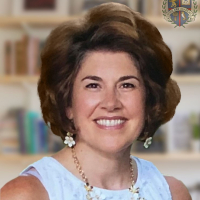Following a Fellowship

Each September students click into the first class for Literature 6 at Veritas Scholars Academy expecting a normal literature class with the usual amount of reading and the usual amount of comprehension questions. They little expect it when, quite suddenly, enchanting stories whisk the sixth-grade souls upward into a literary adventure! Delighted, teacher and students “buckle up” and “hold onto our hats” as we explore distant lands, mysterious cultures, rich histories, and geographic wonders together.
Our journey begins instantly as we circumnavigate the world with Phileas Fogg in Jules Verne’s Around the World in 80 Days. The race against time sweeps young readers from upper-crust London to Suez in Egypt, to Bombay and Calcutta in India, to Hong Kong to Yokohama in Japan, then across 19th century America and back again to London. Fogg’s poise and confidence in the face of danger and delay astound the scholars. Even so, we learn that “Man plans his way, but the Lord directs his path” (Proverbs 16:9). With Fogg’s adventures in mind, the young sixth graders craft a rain forest of their own for the first project of the year. Students cannot read this page-turner quickly enough to discover if Phileas Fogg will indeed win his wager!
From London, we head north following the Scottish accent and find young David Balfour stepping out of the front door of his country home to seek his fortune in Kidnapped by Robert Louis Stevenson. Fleeing with David through the firths and fjords of the Scottish Highlands in the shadow of the Scotch Rebellion, students relate to this determined fugitive as he comes of age in his flight and discovers that God truly does “work all things for good for those who love him and are called according to his purpose” (Romans 8:28).
Our second literary lap around the world, again to India with Rudyard Kipling, provides my bibliophiles with remarkable adventure as we experience, along with Mowgli, what it’s like to be a sheep among wolves. We wonder in suspense if Mowgli will outwit the black-hearted Shere Khan. Adolescent readers witness remarkable self-control as Rikki-Tikki-Tavi takes on the wicked Nag and Nagina. Perseverance is personified as the White Seal puts aside his own comforts to find a better life for those he loves. Learning to weave baskets just like Mowgli, the lives of VSA’s sixth-graders intersect with the setting and experience of the Jungle Book and the second project of the year is completed.
From India, we once again make our way to the streets of London just in time to witness the remarkable transforming effect of truth on the miserly Ebenezer Scrooge as he resurrects from spiritual death to life in Charles Dicken’s A Christmas Carol. It is plain to see as we journey with the Ghosts of Christmas Past, Present and Future that sinners need a Savior to “break the chains they forge in life.” Students are challenged to consider whether a similar epiphany has occurred within their own hearts. Will it be always winter and never Christmas in the recesses of their souls?
In the second semester, my sixth-grade students are on the cusp of the dialectic stage as we make our way from beloved Britain across the Atlantic to Civil War Era Concord, Massachusetts. Here my readers are entrusted with a first look at the deceptive nature of post-modern philosophies. Students learn to discern the stealthy lies of transcendental beliefs that influenced the life and writings of Louisa May Alcott in Little Women. They enjoy a delightful story, and, for their project, learn to make scrumptious March family recipes. At the same time, however, students observe how slightly altered truth leads to a bitter, man-centered gospel of humanism—a false gospel that robs the human soul of the grace and peace found only in Jesus Christ. The emerging preteens relate to Jo’s desire to be good and dutiful and conquer her faults. Jo’s frustration that she cannot “transcend” to be a better person through her own efforts resonates with sixth graders in their own struggles as they come of age.
Having witnessed the trials and travails of our characters and cheered them on in life together, Literature 6 transforms in the second semester from a literary adventure to a Literary Fellowship of shared experiences. Our academic globetrotting now transports us to Alaska and the Yukon Territory where we follow characters who risk everything in search of earthly treasure during the Klondike Gold Rush of 1897. As students observe the transforming effect of John Thornton’s love for Buck in Call of the Wild and the life-changing affection of Weedon Scott toward White Fang in the novel by the same name, they are prompted to consider how their own examples of love and care can have an impact on those around them. My bookworms are challenged to contemplate Jesus’ warning, “For where your treasure is, there your heart will be also.” Budding teens must grapple with whether they are seeking worldly or heavenly treasure. Also, at this destination, I guide my students to examine traces of evolutionary and naturalistic thought in Jack London’s beloved dog tales. Soberly, we observe the impact of godless thinking on Jack London’s own life, and the Gospel shines brightly against the grim backdrop of these futile philosophies. As we leave White Fang loved and contented in the Santa Clara Valley, my sixth graders are well-prepared to enter future dialectic level pursuits in literature, history, and theology through VSA’s Omnibus courses.
For the final destination on the Literary 6 itinerary, our fellowship of readers enters the imaginary world of the Shire for J.R.R. Tolkien’s The Fellowship of the Ring. Frodo’s willingness to lose all he holds dear to fulfill his difficult and dangerous mission inspires the young, yet maturing, readers. As Frodo and friends seek to deliver the ring to Mordor, students feel that they are journeying along with the hobbits through the magical lands of Rivendell and Loth Lorien. My students see true friendship exemplified in the affection that exists between Frodo, Sam, Merry, and Pippin. While cheering on the hobbits in their toilsome journey, the soon-to-be seventh graders construct beautiful age-old maps becoming entwined with the setting of Middle Earth, and completing their final project of the year. While in Middle Earth, students perform a dramatic reading from their favorite Literature 6 novel. Our hearts are full as we encourage and applaud the performances that serve as the final exam for the course.
Before we know it, the breaking of our own Fellowship is inevitable, and students feel Frodo’s responsibility is not unlike their own. The scholars have been shaped by our bookish adventures through geography lessons, vocabulary studies, journal writing, creative projects, and games. The intimacy of these shared travels and shared stories makes it difficult to say goodbye. Each inspiring tale has left its mark, bearing the sixth grade soul upward. The lessons cannot be forgotten or denied. As Teacher, I must release my students into the world as dialectic stewards of the truth they now bear. Like David Balfour, these truth-bearers must crack the door and peer outside of themselves. They must step forth from their own front doors into a hostile world and seek to find their own fortune of heavenly treasure.
Teresa has 35 years of teaching experience with students ranging from third through eleventh grades in various settings. She has developed her own literature and writing courses, including a year-long intensive study of Shakespeare’s plays. Before moving to Lancaster, PA (where she enjoys kayaking and rope-swinging in the Conestoga River), she founded River Oaks Academy, a homeschool literature, writing, and Shakespeare cooperative in Philadelphia. The delight of her life has been seeing the fruit of homeschooling in the lives of her three children.







